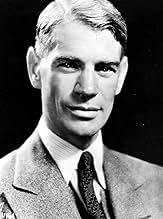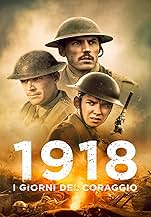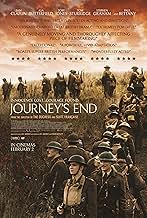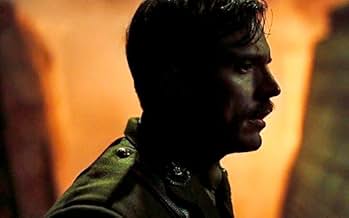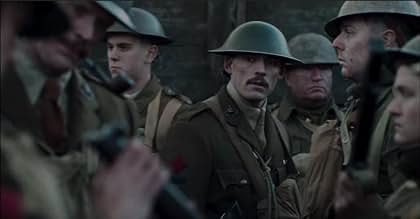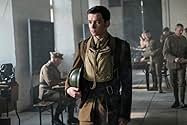IMDb-BEWERTUNG
6,7/10
11.983
IHRE BEWERTUNG
Es spielt in einem Unterstand in der Aisne im Jahr 1918 und erzählt die Geschichte einer Gruppe britischer Offiziere, angeführt von dem sich geistig auflösenden jungen Offizier Stanhope, die... Alles lesenEs spielt in einem Unterstand in der Aisne im Jahr 1918 und erzählt die Geschichte einer Gruppe britischer Offiziere, angeführt von dem sich geistig auflösenden jungen Offizier Stanhope, die auf ihr Schicksal warten.Es spielt in einem Unterstand in der Aisne im Jahr 1918 und erzählt die Geschichte einer Gruppe britischer Offiziere, angeführt von dem sich geistig auflösenden jungen Offizier Stanhope, die auf ihr Schicksal warten.
- Auszeichnungen
- 4 Gewinne & 3 Nominierungen insgesamt
Empfohlene Bewertungen
This is definitely one of the best war movies I have ever seen.
No Rambo actions in this one. The title really depicts what the movies is all about A Journey's End. The brutality of war. Good men die like that . In times of war orders are orders. It is sad. I wonder all this potential gone to waste . Over 60 million people died in world wars. Countries destroyed. I wonder how the world would have been liked if only ...
I recommend you see this movie with high quality video . The sound is amazing& the cinematic . The acting is superb .
If you think that war is exciting . Think again . You ought to see it. Deserves a better rating.
"Journey's End" takes place in the trenches of the Western Front in 1918. It was originally a very successful stage play in 1928 starring Lawrence Olivier in what must have been one of his first leading roles. In 1930 a film version was produced, one of the earliest British "talking pictures", directed by James Whale and starring Colin Clive (soon thereafter both were to re-team in the memorable films, "Frankenstein" and "Bride of Frankenstein).
The above is worth pointing out because the 1930 version which is still available for viewing on Youtube, makes an interesting comparison with this current production of the same story. That is because, meticulous as this production is, it was produced a century after the events depicted in the film. To the makers of this version, this material is ancient history. To the makers of the 1930 version, it was only a dozen years ago. Indeed, James Whale, who directed the 1930 film, actually had been a British officer on the Western Front during World War I. Consequently, to him, getting the details and the atmosphere right was not a matter of researching historical records, he had only to search his own memory.
Apart from the color photography and the differences in acting styles, one big difference is that the 1930 version had a lot more humor in. While the 2017 version seems unrelentingly grim, the characters in the 1930 version exhibit a lot more of the sort of dark humor that one might expect from troops in the front lines. It is almost as though that aspect of the play did not occur to the director, or else he had simply ignored it. Either that, or perhaps that sort of humor is now considered "politically incorrect".
Nevertheless, "Journey's End" is a highly evocative depiction of the Great War, and well worth seeing in this, the centennial of the end of "The War to End ALL Wars".
The above is worth pointing out because the 1930 version which is still available for viewing on Youtube, makes an interesting comparison with this current production of the same story. That is because, meticulous as this production is, it was produced a century after the events depicted in the film. To the makers of this version, this material is ancient history. To the makers of the 1930 version, it was only a dozen years ago. Indeed, James Whale, who directed the 1930 film, actually had been a British officer on the Western Front during World War I. Consequently, to him, getting the details and the atmosphere right was not a matter of researching historical records, he had only to search his own memory.
Apart from the color photography and the differences in acting styles, one big difference is that the 1930 version had a lot more humor in. While the 2017 version seems unrelentingly grim, the characters in the 1930 version exhibit a lot more of the sort of dark humor that one might expect from troops in the front lines. It is almost as though that aspect of the play did not occur to the director, or else he had simply ignored it. Either that, or perhaps that sort of humor is now considered "politically incorrect".
Nevertheless, "Journey's End" is a highly evocative depiction of the Great War, and well worth seeing in this, the centennial of the end of "The War to End ALL Wars".
I just want to provide a quick calibration of what people should expect from this movie because some of the reviewers seem to have had a misconception of what this movie was supposed to be about. This is not a war movie - it's a movie about war. Specifically, the affects of trench warfare on a group of soldiers. Too that end, the movie is absolutely brilliant from the moment it begins to the moment it ends. You will not see long drawn out battle scenes, hand to hand combat, fire-fights, bloody carnage or anything else you've recently seen in Hacksaw Ridge, Lone Survivor or Fury. What you will see is the persistent and inevitable deterioration of the innocence and humanity of the characters as their fate, which they all know is coming, slowly but surely creeps up on them from one day to the next. Many other reviewers have used the term, "disturbing", to describe this movie and I agree 100%. It is highly disturbing, on a psychological level. You won't leave this movie feeling good or motivated to join the military; you will leave it with a loss to understand why humanity ends up in situations like this to begin with.
I was fortunate enough to see the premiere of this film at the London Film Festival, and went in with no prior knowledge of the story or the characters, and was blown away by the impact this film has. Each actor suited their role perfectly, with Sam Claffin adding a smooth, sophisticated yet equally mysterious spin on the title character, Toby Jones adding fantastic one-liner humour to give the script more depth, and the other characters making the film's narrative put you on the edge of your seat. Usually I brush over war films, as I find the production and aesthetic quite similar. However, this film left me with lots of powerful thoughts and I am grateful to be one of the first to see it! Its now clear to see that this was based on a play, as the majority of the scenes were shot within the same set, with the focus on the characters' progression and the narrative as a whole, but this really worked! This is a film I highly recommend seeing- superb acting, released at a fitting time (its release being 100 years after the end of WW1), beautiful cinematography, a powerful script, and so much more! I will be seeing this again at the next given chance. So stop watching these big Hollywood remakes, be ready to be lost in the charm of this war film, and witness something quite special, that will hit you hard!- Sam Bishop
To me, "Journey's End" is a far better film than the rating may lead one to believe. It's an intense war film with extremely realistic sets and clothing. The film puts you right into the trenches of WWI in way that I've never experienced before in a film.
Adapted from a play, "Journey's End" takes place primarily right in the trenches and underground officer's quarters, with the characteristic lack of set changes that come with plays and films adapted from them. While the movies are nothing alike in any way, I was reminded of the classic film "Glengarry Glen Ross," as it was also adapted from a play. When a film is adapted from a play and done right, it gains a certain intensity that is sometimes lacking in standard films. This played perfectly into the WWI trench atmosphere - a constricted, confined, intense space.
These sort of movies become character focused and the actors can really shine. Therein lies my only real critique of "Journey's End," in that I found some of the acting to be a bit uneven. I have nothing against Sam Clafin (Captain Stanhope), but he failed to carry this film, even though the story is ostensibly about him. The drinking in particular bothered me - the character drank whiskey like it was water but came across as too sober and clear-eyed for it to be believable.
But overall, "Journey's End" is a compelling look at a war that perhaps doesn't get the attention it deserves. Maybe it was so horrible, we'd just rather forget all about it, but therein lies the danger.
Adapted from a play, "Journey's End" takes place primarily right in the trenches and underground officer's quarters, with the characteristic lack of set changes that come with plays and films adapted from them. While the movies are nothing alike in any way, I was reminded of the classic film "Glengarry Glen Ross," as it was also adapted from a play. When a film is adapted from a play and done right, it gains a certain intensity that is sometimes lacking in standard films. This played perfectly into the WWI trench atmosphere - a constricted, confined, intense space.
These sort of movies become character focused and the actors can really shine. Therein lies my only real critique of "Journey's End," in that I found some of the acting to be a bit uneven. I have nothing against Sam Clafin (Captain Stanhope), but he failed to carry this film, even though the story is ostensibly about him. The drinking in particular bothered me - the character drank whiskey like it was water but came across as too sober and clear-eyed for it to be believable.
But overall, "Journey's End" is a compelling look at a war that perhaps doesn't get the attention it deserves. Maybe it was so horrible, we'd just rather forget all about it, but therein lies the danger.
Wusstest du schon
- WissenswertesPlaywright R.C. Sherriff had seen first-hand the effect of years of war on his friends and knew the fear and terror of waiting for an impending attack, waiting for his journey's end. The characters in the play are a reflection of the men Sherriff had served with in the 9th Battalion of the East Surrey Regiment.
- PatzerA common misconception is the myth about having your chinstrap unbuckled. It is mainly an American thing that was spread in WW2. Fact is, if the concussion was strong enough to hurt your neck or face because your chinstrap was buckled, the force of the same concussion would more than likely kill you. Having your strap undone just meant you would spend a lot of time holding your helmet on while moving fast.
- Zitate
Lieutenant Osborne: Every little noise up there, makes me feel sick.
- VerbindungenFeatured in Projector: Journey's End (2018)
- SoundtracksElevation
Written and performed by Hildur Guðnadóttir
Top-Auswahl
Melde dich zum Bewerten an und greife auf die Watchlist für personalisierte Empfehlungen zu.
- How long is Journey's End?Powered by Alexa
Details
Box Office
- Bruttoertrag in den USA und Kanada
- 161.796 $
- Eröffnungswochenende in den USA und in Kanada
- 11.798 $
- 18. März 2018
- Weltweiter Bruttoertrag
- 970.809 $
- Laufzeit
- 1 Std. 47 Min.(107 min)
- Farbe
- Seitenverhältnis
- 1.85 : 1
Zu dieser Seite beitragen
Bearbeitung vorschlagen oder fehlenden Inhalt hinzufügen





